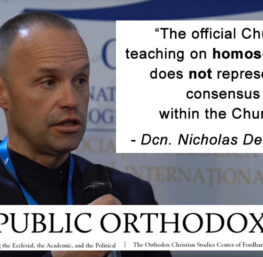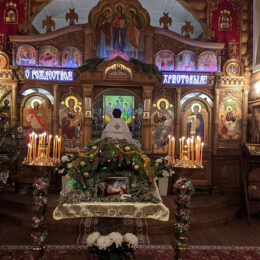By Fr. Patrick Reardon
It is well known that commerce tends to dominate the transmission of culture across geographical divides and ethnic lines. It is the merchants, arriving from afar, who chiefly barter the achievements and accoutrements of diverse civilizations; it is businessmen who tie the world together.
Knowing this, we are hardly surprised to learn that history’s earliest examples of shared international vocabulary—words and phrases commonly adopted across deep linguistic divisions—derived from the lexicon of commerce. The traveling salesman, as he transported his commodities, transmitted also the terms of trade. When merchandise made its way across the world, mercantile expressions tagged along, if only in the sense of a price tag. As the products became common, so did the words.
A perfect illustration of this phenomenon is the ancient Semitic term ‘erabon, meaning “pledge” or “guarantee.” At the beginning of the second millennium B.C. the Akkadians in Mesopotamia were already using this word. Over the ensuing centuries it was adopted by the roving hordes who descended from the Caucasus. These, along with the fleeing Hebrews they drove before them, carried the word across to the western side of the Fertile Crescent, where the Phoenicians took it in hand and bore it over to Carthage. Further north in the Mediterranean, it was adopted by a new mercantile power called Rome. Earlier its travels, as well, the word ‘erabon had already slipped further south, wending its way into Arabic.
In the Hebrew Bible ‘erabon is the word used in reference to the “pledge” that Judah gave to his daughter-in-law Tamar in Genesis 38:17-20. The Septuagint translators of this text had no trouble finding a Greek equivalent. It already existed as the loan word arrabon.
This Greek variant of the ancient term is extant in various papyri and ostraca, where it sometimes takes on the meaning of “deposit,” “earnest money,” or “down payment.” We find it also in Aristotle (*Politics* 1.11).
In Latin (Terence, Plautus, et alii) the same term is extant as the noun arrhabo (sometimes shorted to arrho). It was the word Jerome had ready to hand for his Vulgate version of Genesis 38.
The arrabon was an instrument of commercial assurance; it pertained to the essence of commerce, far deeper than the products in which it traded. The importance of mutual trust was obvious to the ancient businessmen who controlled the ships and caravans joining the Persian Gulf, the Bosporus, and the Straits of Gibraltar—men who hazarded vast fortunes on the warranted word of other businessmen at the distant ends of their endeavors. That guarantee, that pledge, the arrabon, was the token of a social commitment essential to prosperity and civilization.
The Apostle Paul, as he traveled along the commercial arteries of the Roman Empire and sailed the diverse merchant vessels plying among the bustling ports of the Aegean and Mediterranean, had heard the word arrabon times out of mind. The word appealed to him.
Ever the entrepreneur (Acts 18:3; 20:34), Paul rather often mentioned earning his own living (1 Corinthians 4:12; 9:15; 2 Corinthians 11:7; 12:13; 1 Thessalonians 2:9; 2 Thessalonians 3:8-9). Indeed, he sometimes thought of the Christian faith itself in terms of profit and loss (Philippians 3:7-8; cf. Luke 9:25).
With his businessman’s approach to the faith, it is not surprising that Paul described the Holy Spirit as God’s “guarantee” of the inheritance promised to His children. He wrote, “Now He who establishes us with you in Christ and has anointed us is God, who also has sealed us and has given us the Spirit in our hearts as a guarantee (*arrabon*)” (2 Corinthians 1:21-22). Using the same commercial term, he wrote later in the same epistle of “God, who also has given us the Spirit as a guarantee” (5:5). Some four years or so later, Paul wrote, “you were sealed with the Holy Spirit of promise, who is the guarantee (*arrabon*) of our inheritance” (Ephesians 1:13-14).
In all of these texts Paul seems to understand the arrabon, not only as the pledge, but also as the “first installment” (cf. “the aparche of the Spirit” in Romans 8:23) of our promised inheritance. That is to say, the Father has already made the initial deposit of eternal life into our hearts by the sealing of the Spirit. Now it is the business of a “down payment” to include immediate occupancy. This earnest having already been conferred, then, we even may now reside inwardly in the realm of glory.



